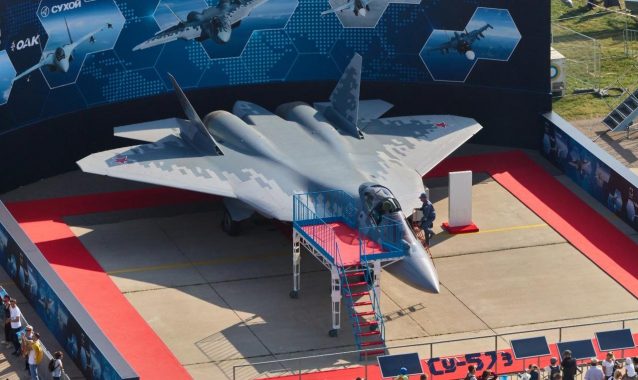SOURCE: RAUNAK KUNDE / NEWS BEAT / IDRW.ORG

In a bid to bolster its presence in the global aviation market, Russia’s Rosoboronexport is proposing a trilateral co-production plan for its fifth-generation Su-57E fighter jets with India and the United Arab Emirates (UAE). This strategic move comes at a time when both India and the UAE are considering their options for acquiring next-generation fighter aircraft.
The UAE, which has suspended talks with the US regarding a $23 billion deal for the purchase of 50 F-35 fighter jets, is seeking alternatives to meet its defence requirements. The Su-57E, with its advanced stealth capabilities and impressive performance, has emerged as a potential contender for the UAE’s fighter jet program.
India, on the other hand, is pursuing the development of its indigenous fifth-generation fighter jet under the AMCA program. However, the AMCA program is still in its early stages, with prototype testing expected to begin in 5-7 years and induction into service another 5-7 years after that.
Russia’s proposal for trilateral co-production of the Su-57E presents an attractive option for both India and the UAE. The co-production model would allow both countries to share the costs and benefits of manufacturing the Su-57E, while also gaining access to advanced technology and expertise.
Under the proposed co-production plan, Su-57E fighter jets would be partially manufactured in the UAE, Russia, and India, with each partner country receiving a specific work share agreement. This arrangement would not only boost the economies of the participating countries but also open up opportunities for exporting the Su-57E to other interested nations.
While the UAE has yet to officially respond to Russia’s proposal, the prospect of co-producing the Su-57E could prove to be an enticing one, given the aircraft’s capabilities and the potential for industrial collaboration. India, which had previously walked out of the FGFA program, a joint venture with Russia to develop a twin-seater variant of the Su-57, may also reconsider its stance in light of the co-production proposal.
Russia’s proposal for trilateral co-production of the Su-57E signifies a significant shift in its approach to international defence partnerships. By offering a co-production model, Russia is seeking to expand its global reach and establish itself as a leading provider of advanced military technology.
The success of this proposed co-production venture will depend on the level of commitment and cooperation among the participating countries. If the parties can successfully navigate the complexities of a trilateral partnership, the co-production of the Su-57E could not only fulfil the respective defence needs of India and the UAE but also set a new precedent for international defence collaborations.
NOTE : Article cannot be reproduced without written permission of idrw.org in any form even for YouTube Videos to avoid Copy right strikes. Websites doing illegal reproductions will get DCMA and Legal Notices.